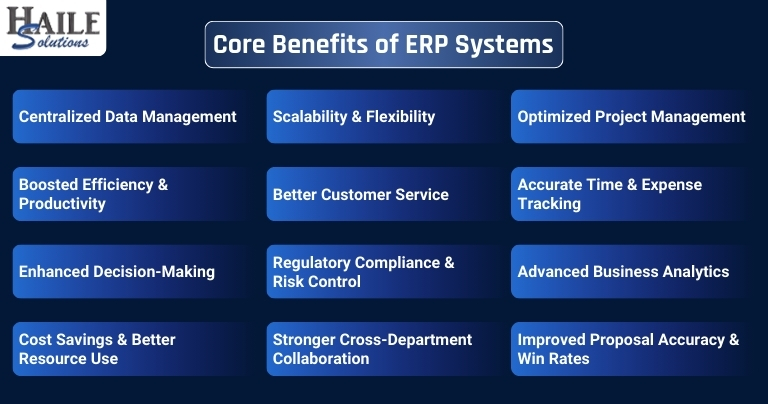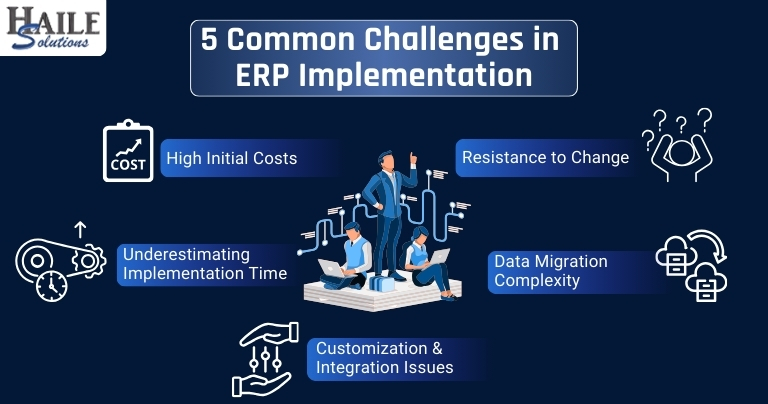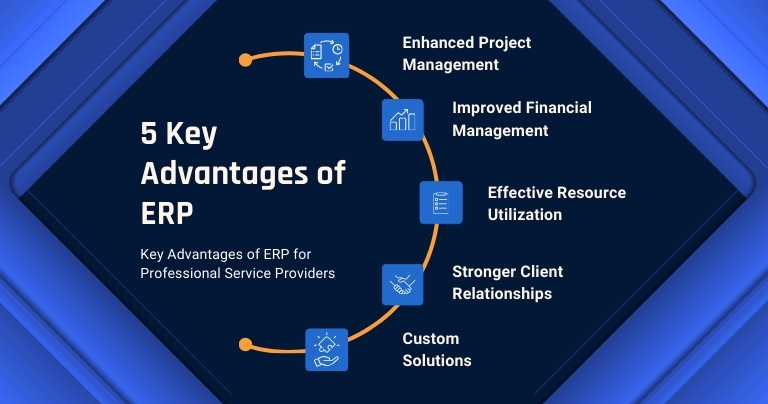Enterprise Resource Planning (ERP) systems are comprehensive software solutions designed to integrate and manage a business’s core processes, such as finance, human resources, project management, and customer management. In today’s data-driven world, businesses of all sizes rely on ERP systems to streamline operations, boost productivity, and support informed decision-making, ensuring smoother workflows and organizational efficiency.
An ERP system unifies various business functions into a single platform, eliminating inefficiencies caused by disconnected systems and manual processes. This integration allows organizations to align their resources with strategic goals, making ERP a transformative solution for businesses aiming to remain competitive.
How to Know if Your Business Needs an ERP System?
Businesses, particularly those in project-based or professional services, often encounter challenges like managing complex projects, balancing resources, and maintaining visibility across departments. ERP systems provide real-time insights and automation to address these issues, enabling businesses to operate more effectively and efficiently.
Moreover, ERP systems help businesses adapt more quickly to market changes and evolving customer demands by offering a flexible framework that integrates all core functions into a single platform. This adaptability is crucial for staying competitive in today’s dynamic business environment, where quick analysis & decision-making are key to success.
Core Benefits of ERP Systems

1. Centralized Data Management
ERP systems provide centralized data management by consolidating business data across all departments—finance, HR, sales, and supply chain into one unified platform. This eliminates data silos, ensuring all departments have access to consistent, up-to-date information, which improves decision-making and coordination. This is one of the key benefits of ERP systems, as it enables businesses to operate more cohesively.
Benefits of Centralized Data Management and Integration
- Improved Data Accuracy: ERP systems reduce errors by ensuring data is entered once and shared across all functions, providing reliable reporting and analysis.
- Seamless Integration: They integrate smoothly with other business applications, such as CRM and accounting software, enabling continuous data flow and reducing manual tasks.
- Improved Accessibility: A centralized system makes information readily available to employees, improving response times and productivity.
- Streamlined Operations: ERP systems enhance efficiency and reduce costs by automating tasks such as invoicing, order processing, and inventory updates.
- Real-Time Insights: Integrated ERP systems offer real-time visibility across all connected applications, supporting better reporting and informed decision-making.
ERP systems help businesses operate more cohesively and efficiently by combining centralized data management with integration capabilities. Seeking expert guidance can further optimize ERP implementation to maximize these benefits.
2. Improved Business Efficiency and Productivity
ERP systems improve efficiency and productivity by automating routine tasks and optimizing workflows across departments. By integrating core business functions into a single platform, ERP systems reduce manual work and allow employees to focus on strategic activities. These are among the most significant benefits of ERP software.
How do ERP Systems Improve Efficiency and Productivity?
- Automation of Routine Tasks: Automates repetitive tasks like data entry, order processing, and payroll, reducing errors and freeing up time for value-added activities.
- Standardized Workflows: Establishes consistent workflows across departments, minimizing bottlenecks and improving coordination.
- Better Resource Management: Provides a comprehensive view of resources, enabling more effective allocation and reducing operational costs.
- Better Collaboration: Improves communication and real-time data access, promoting better coordination and quicker decisions.
By integrating these capabilities, ERP systems help businesses achieve greater efficiency, higher productivity, and reduced costs. Choosing the right ERP system customized to specific needs is key to optimizing operations and enjoying the full merits of ERP.
3. Better Decision-Making Capabilities
ERP systems empower businesses with real-time access to comprehensive data and analytics, which is important for making informed, strategic decisions in today’s fast-moving times. These benefits give companies a competitive edge.
How ERP Systems Improve Decision-Making?
- Real-Time Reporting: Provides up-to-date information on key metrics like sales, inventory, and finances, enabling quick, confident responses to changes.
- Data-Driven Insights: Analyzes historical data to identify trends and opportunities, supporting strategic planning.
- Centralized Data Access: Consolidates data from various departments, ensuring decision-makers have accurate, consistent information, supporting alignment on goals.
- KPI Monitoring: Tracks key performance indicators in real-time, helping businesses assess performance, identify improvement areas, and adjust strategies proactively.
By leveraging real-time data and analytics, ERP systems help businesses make smarter, faster decisions, demonstrating the benefits of Enterprise Resource Planning in a complex marketplace.
4. Cost Reduction and Improved Resource Management
ERP systems reduce operational costs and improve resource management by integrating and streamlining business processes, contributing to overall financial stability. This is one of the major advantages of ERP.
Ways ERP Systems Reduce Costs and Improve Resource Management:
- Reduced Operating Costs: Consolidates business functions into a single platform, minimizing licensing fees, maintenance expenses, and IT support costs.
- Better WIP (Work In Progress) Management: Provides real-time visibility into WIP, reducing write-off costs and improving cash flow.
- Optimized Resource Allocation: Offers a clear view of resources, enabling efficient allocation and maximizing productivity.
- Minimized Redundant Processes: Automates tasks, reducing labor costs, time, and the risk of costly errors.
ERP systems are key to cutting unnecessary expenses and maximizing resources for businesses looking to operate efficiently, leading to a strong return on investment.
5. Scalability and Flexibility
ERP systems are designed to grow with businesses, providing the scalability and flexibility needed to adapt to changing market conditions and evolving needs. This adaptability is a significant advantage of ERP software.
How ERP Systems Provide Scalability and Flexibility?
- Adaptable to Growth: Handle increased transactions, users, and operations, allowing businesses to scale without significant additional costs or disruptions.
- Customizable Features: Offer modular architectures so companies can add or remove features as needed, ensuring they only pay for functionalities they use.
- Integration Capabilities: Seamlessly integrate with other software, such as CRM and e-commerce platforms, supporting technological advancements and strategic shifts.
- Cloud-Based Options: Provide access from anywhere, support remote work, and reduce costs associated with on-site infrastructure.
Investing in a scalable and flexible ERP system is essential for businesses looking to future-proof their operations to support growth and long-term success.
6. Improved Customer Service and Satisfaction
ERP systems enhance customer service by centralizing data, improving communication, and ensuring timely delivery of products or services.
- Unified Customer Data: Centralizes all customer information, enabling personalized service and increasing satisfaction.
- Faster Response Times: Provides instant access to inventory, order status, and billing details, allowing quick and accurate responses to customer inquiries.
- Improved Order Accuracy: Automates workflows to minimize processing errors, reducing returns and complaints.
- On-Time Delivery: Optimizes inventory management and supply chain operations, ensuring consistent product availability and timely delivery, strengthening customer loyalty.
Investing in a customer-focused ERP system helps businesses differentiate themselves in competitive markets by providing a seamless experience, facilitating stronger customer relationships, and driving growth.
7. Regulatory Compliance and Risk Management
ERP systems help businesses manage compliance and reduce risks by centralizing data and automating processes.
How do ERP Systems Support Compliance and Risk Management?
- Automated Compliance Reporting: Simplifies compliance by automating report generation, reducing administrative burdens, and minimizing the risk of non-compliance penalties.
- Audit Trails and Data Security: Tracks all transactions and changes, providing transparency for audits and ensuring adherence to financial, operational, and data security regulations.
- Controlled Access and Permissions: Limits data access based on user roles, ensuring sensitive information is protected and reducing the risk of breaches or internal fraud.
- Standardized Processes: Ensures all departments follow consistent practices, reducing the risk of non-compliance due to inconsistencies.
By leveraging these capabilities, businesses can confidently meet regulatory requirements and protect their data in regulated industries.
8. Strengthening Collaboration Across Departments
ERP systems improve collaboration by breaking down departmental silos and providing a centralized platform for communication and data sharing, ensuring alignment across the organization.
How ERP Systems Encourage Collaboration?
- Unified Information Access: Provides a single source of truth for all business data, reducing miscommunication and enhancing teamwork with accurate, real-time information.
- Streamlined Communication: Facilitates communication across departments, allowing quick updates, issue resolution, and improved efficiency.
- Cross-Functional Workflows: Enables seamless workflows between departments, ensuring tasks are completed efficiently and keeping everyone aligned.
- Remote and Hybrid Work Support: Offers tools for real-time collaboration regardless of location, maintaining productivity in remote and hybrid environments.
ERP systems help create a more integrated, agile, and responsive workforce by building a cohesive platform for collaboration.
9. Optimized Project Management for Professional Services
ERP systems offer robust project management tools designed specifically for professional service firms. These tools help track project timelines, budgets, and resource allocation in real-time, ensuring projects remain on schedule and within budget. This reduces the risk of cost overruns and improves client satisfaction, highlighting the advantage of ERP systems. For more insights on managing billing rates effectively, refer to our Demystifying Billing Rates for Professional Services guide.
How ERP Systems Optimize Project Management
- Real-Time Tracking: Monitors project progress, resource utilization, and budgets in real-time, allowing for timely adjustments.
- Automated Workflows: Streamlines project-related tasks, such as approvals, billing, and reporting, reducing administrative overhead.
- Resource Optimization: Ensures the right personnel are assigned to tasks based on availability, skills, and project requirements, maximizing productivity.
- Improved Client Communication: Provides clients with a transparent view of project status, enhancing trust and satisfaction.
10. Accurate Time and Expense Tracking
ERP systems simplify time and expense tracking by providing integrated solutions for logging billable hours, expenses, and travel costs. This ensures precise client billing, reduces administrative workload, and improves cash flow.
How do ERP Systems Improve Time and Expense Tracking?
- Automated Logging: Automatically tracks billable hours and expenses, minimizing manual entry and reducing errors.
- Integrated Invoicing: Links time and expense data directly to invoicing, ensuring accurate and timely client billing.
- Expense Management: Provides tools to categorize and manage expenses efficiently, enhancing financial oversight.
- Visibility and Accountability: Offers a clear view of time and expense data, facilitating better decision-making and accountability across the organization.
11. Advanced Analytics for Business Insights
ERP systems provide advanced analytics capabilities, delivering insights into key business metrics such as project profitability, client acquisition costs, and employee performance. These insights enable professional service firms to make informed decisions, refine strategies, and discover growth opportunities.
How ERP Systems Enhance Business Insights?
- Comprehensive Reporting: Generates detailed reports on various business metrics, enabling data-driven decision-making.
- Predictive Analytics: Uses historical data to forecast future trends, helping firms plan for growth and manage risks.
- Performance Monitoring: Tracks key performance indicators (KPIs) specific to projects and clients, allowing for proactive management.
- Custom Dashboards: Provide customizable dashboards for real-time monitoring of valuable business data, enhancing responsiveness.
12. Improved Proposal Accuracy and Win Rates
ERP systems leverage historical data on project costs, timelines, and client preferences to create more accurate and convincing proposals. This data-driven approach increases the likelihood of winning new business by providing customized solutions that meet client needs.
How ERP Systems Improve Proposal Accuracy?
- Data Integration: Uses past project data to inform cost estimates, resource planning, and delivery timelines.
- Template Management: Offers standardized templates for proposals, ensuring consistency and professionalism.
- Client Insights: Analyzes client preferences and past interactions to customize proposals, improving relevance and appeal.
- Win Rate Tracking: Monitors proposal success rates, allowing firms to adjust strategies and improve future performance.
Common Challenges in ERP Implementation and How to Overcome Them
Implementing an ERP system can be transformative for a business, but it also comes with challenges that must be carefully managed to ensure a smooth transition. Effectively addressing these common hurdles can help organizations fully realize the benefits of an ERP system and maximize their investment.

Common Challenges and Solutions
- High Initial Costs: ERP implementation often involves significant upfront costs, including software licenses, hardware upgrades, and consulting services. To manage these expenses, businesses should assess the total cost of ownership and consider options like modular implementations, which allow for gradual adoption and expansion based on needs and budget constraints.
- Resistance to Change: Employees may resist shifting to a new system due to unfamiliarity or fear of workflow disruptions. Overcoming this challenge requires a robust change management strategy, including comprehensive training, transparent communication, and involving key stakeholders early in the process to build support and buy-in.
- Data Migration Complexity: Transferring data from existing systems to a new ERP platform can be complex, with potential data loss or error risks. A thorough audit and data cleansing process and a structured migration plan before migration are crucial. Partnering with experienced consultants can mitigate these risks, ensuring data integrity throughout the transition.
- Customization and Integration Issues: Customizing an ERP to fit specific business processes or integrating it with existing software can be challenging. To deal with these complexities, businesses should choose ERP solutions known for flexibility and seamless integration capabilities. Consulting with experts can help tailor the ERP system effectively to meet unique business requirements.
- Underestimating Implementation Time: ERP projects often require more time than initially anticipated, leading to rushed processes and mistakes. Setting realistic timelines, maintaining clear communication, and relying on experienced project managers can help keep the implementation on track.
Partnering with knowledgeable consultants like Haile Solutions can significantly help overcome these challenges. With expertise in project management, change management, and data migration, Haile Solutions provides customized strategies that align with the business’s specific needs, ensuring a smoother and more efficient ERP implementation.
How do Different Industries Benefit from ERP Systems?
- Professional Services: Project-based industries like consulting firms, law practices, and engineering companies utilize ERP systems to manage projects, resources, and time tracking effectively. These systems provide real-time insights into project progress, costs, and resource utilization, optimizing performance and increasing profitability. Haile Solutions specializes in consulting services for professional services firms, guiding them in selecting the right ERP and implementing it efficiently to manage their project-based operations effectively.
- Manufacturing: ERP systems manage complex supply chains, optimize inventory, and schedule production runs in the manufacturing sector. They provide real-time visibility into processes, helping manufacturers reduce waste, cut costs, and meet delivery deadlines. ERPs also support quality control by integrating with production systems to ensure standards and compliance. The benefits of an enterprise resource planning system in manufacturing include improved operational efficiency and better resource management.
- Retail: For retail businesses, ERP systems integrate point-of-sale (POS) systems, inventory management, customer data, and financial processes into one platform. This integration helps maintain accurate stock levels, forecast demand, and improve customer service by connecting both online and offline sales channels seamlessly. A cloud-based ERP offers additional advantages such as real-time data access and reduced IT infrastructure costs.
- Healthcare: In healthcare, ERP systems manage critical data, such as patient records and billing information, while also handling supply chain logistics for medical supplies. This integration helps healthcare providers increase operational efficiency, reduce administrative overhead, and ensure compliance with stringent data privacy regulations.
- Education: ERP systems manage student information, faculty data, payroll, and budgeting in the education sector. They automate administrative tasks, streamline admissions, and help institutions maintain compliance with educational standards.
Key Advantages of ERP Systems for Professional Service Providers:

- Enhanced Project Management: Real-time insights into project progress, costs, and resource allocation help optimize performance and profitability.
- Improved Financial Management: Streamlined billing, invoicing, and payment processes reduce errors and ensure timely payments, which is crucial for maintaining cash flow.
- Effective Resource Utilization: Better management of time and resources leads to more efficient operations and cost savings.
- Stronger Client Relationships: Efficient management of client contracts and data builds trust and satisfaction.
- Custom Solutions: Customized ERP systems, like those implemented by Haile Solutions, cater specifically to the unique needs of professional service firms.
Comparison of ERP Systems: Cloud vs. On-Premises
| Feature | Cloud-Based ERP | On-Premises ERP |
|---|---|---|
| Initial Costs | Lower upfront costs; no need for extensive on-site hardware or IT infrastructure. | Higher initial costs due to hardware and infrastructure requirements. |
| Scalability and Flexibility | Easily scalable to accommodate changes in business size or needs. | On-site resources and capacity may limit scalability. |
| Accessibility | Accessible from anywhere with an internet connection; supports remote work. | Restricted to on-site access unless additional remote access solutions are implemented. |
| Automatic Updates | Managed by the provider, ensuring the system is always up-to-date. | Requires manual updates and maintenance by the internal IT team. |
| Control over Data | Less direct control over data storage, as data is hosted on remote servers. | Full control over data storage and security protocols. |
| Customization | Limited customization compared to on-premises systems. | Greater flexibility for deep customization to meet specific business needs. |
| Data Security | Strong security measures by providers, but some data privacy concerns remain. | Data stays on-site, offering maximum control over security measures. |
Case Studies and Success Stories
Real-world examples of businesses that have successfully implemented ERP systems provide valuable insights into the tangible benefits these solutions can bring. By looking at these success stories, companies can better understand the potential impact of an ERP system on their operations and performance.
Examples of ERP Success Stories
- Mid-Sized CPA Firm: A mid-sized US CPA (accounting firm) had rapidly grown through acquisitions. The firm had several offices in the US, but each office worked as a silo and had different processes and disparate systems. The firm implemented an industry-specific ERP which allowed them to standardize processes, leverage capacity between offices, and get real-time visibility of the businesses’s KPI’s. The firm also used the new ERP as a bedrock of the business to integrate with HR and CRM software. Haile Solutions played a valuable role in guiding the firm through the implementation process, ensuring the solution was delivered in rapid time, together with the HR and CRM systems.
- A Global Professional Services business: This business also grew rapidly through acquisitions and initially allowed every office to have its own ERP. It realized this strategy’s missed opportunities for cost reductions, so it decided to consolidate ERPs. The business also used the implementation of the new ERP as an opportunity to standardize processes and build in regulatory (SOX) compliance and other internal controls. After adopting an ERP system, the business was also able to consolidate its back office and significantly reduce its operating costs. Haile Solutions was valuable in guiding the firm in implementing the software in Latin America, ensuring the solution was customized to its unique project-based needs.
These success stories demonstrate how ERP systems can deliver significant benefits across different industries, from cost savings and process optimization to improved decision-making and customer service.
Conclusion
ERP systems are vital for businesses aiming to streamline operations, improve decision-making, and remain competitive. They centralize data, improve efficiency, reduce costs, and support growth across various industries, from manufacturing to professional services.
However, successful ERP implementation requires careful planning and the right solution choice. Partnering with experienced consultants, like Haile Solutions, can help businesses select and implement the ERP system best suited to their needs, ensuring a smooth transition and maximum benefit. Choosing the right ERP partner is key to achieving strategic goals and driving long-term success.
Frequently Asked Questions
What are the primary benefits of implementing an ERP system for a small or medium-sized business?
ERP systems help small and medium-sized businesses (SMBs) streamline operations by automating routine tasks, centralizing data, and improving inventory management. They reduce costs, enhance decision-making with real-time data, and support scalability, allowing SMBs to compete more effectively with larger enterprises.
Can ERP systems improve collaboration and communication across remote or hybrid teams?
Yes, ERP systems centralize information and offer cloud-based access, enabling teams to collaborate effectively from anywhere. They provide tools for real-time data sharing, project management, and communication, helping remote and hybrid teams stay aligned and productive.
What are the potential disadvantages of using an ERP system?
While ERP systems offer many benefits, potential disadvantages include:
- High Costs: Ongoing expenses for licenses, maintenance, and training.
- Complexity: May be too complex for smaller businesses, leading to increased administrative overhead.
Vendor Dependence: Reliance on vendors for updates and support. - Limited Flexibility: This may require costly customization for unique business needs.
- Data Security Risks: Centralized data can be vulnerable if not properly secured.
Careful evaluation of these factors is essential when considering an ERP system.






